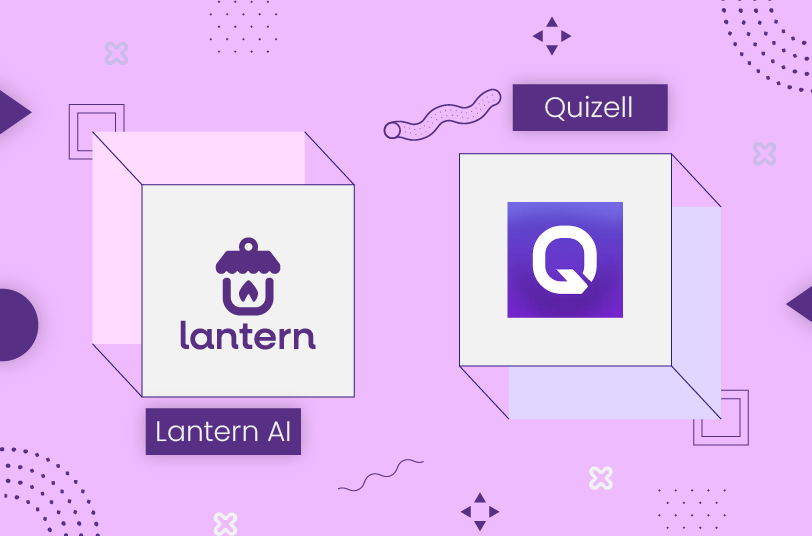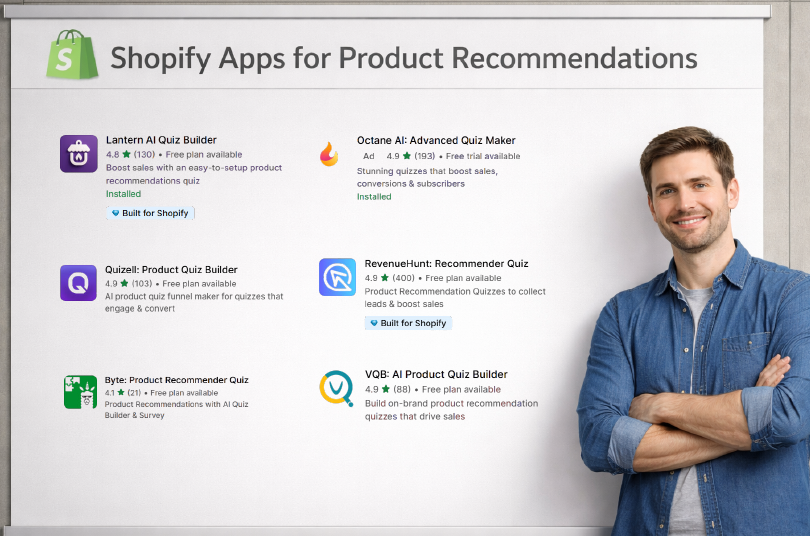Why Use Lantern AI as Quizell App Alternative

Start your success story with Lantern
Book a call with out team now
If you’re exploring Shopify quiz apps, Quizell will often appear alongside other popular builders. It’s a capable quiz and form tool with AI help and broad integrations. Lantern is a modern Quizell alternative that prioritizes flexible design across every quiz page, deep Shopify data support (including metafields), and transparent, usage‑based pricing.
What is Quizell?
Quizell is an ecommerce quiz, form, and funnel builder that helps merchants guide shoppers to products or outcomes through a drag‑and‑drop interface. It offers AI‑assisted quiz creation, logic/branching, email and CRM integrations (like Klaviyo and HubSpot), and supports both embedded and popup quiz experiences. Higher‑tier plans unlock additional customization, API/webhook access, and file uploads.
What is Lantern?
Lantern is a Shopify-native quiz builder for brands that want product recommendations to feel like guided shopping, not just a form. You can spin up quizzes with AI, then refine them in a visual editor using content blocks on every page—adding images, explainer text, videos, opt-ins, or raw HTML wherever you need more context. Under the hood, Lantern supports answer-based matching, optional Shopify metafields, and both skip/show conditions and Logic Jumps, so you can shape different paths for different shoppers without writing code.
Pricing starts at $39/month with a 21-day free trial, and Lantern is brand-free by default—no watermark and no paid upgrade just to remove logos. As a Shopify quiz app alternative to Quizell, Lantern focuses on giving merchants predictable pricing and more control over layout, styling, and product logic from the very first plan.
Feature Comparison: Lantern vs Quizell
Both apps can launch effective product quizzes. The differences below help you decide which fits best.
Key Differentiators
Lantern is a good fit for Shopify brands that want tight control over both the flow and the layout of their quiz, while Quizell leans more toward a lighter, form-style builder with strong AI assistance. Both support branching and conditional rules, but Lantern layers Skip/Show conditions and Logic Jumps (Exact / Open / Broad) on top of AI quiz creation so you can decide exactly which pages appear, in what order, and for which answers—without touching code. Quizell’s jump and score logic works well for straightforward paths, but Lantern’s page-based editor is designed for teams that want to shape more complex journeys while still feeling in control of every step.
When it comes to product recommendations and results, the two apps also take different approaches. Lantern uses answer-based scoring with inclusions and exclusions, so only eligible products, variants, or collections can surface, and the best matches naturally rise to the top. On the same results page, you can stack multiple Dynamic Content Blocks, each with its own mix of products, bundles, or copy that appears only for certain answers or profiles—making it easy to build separate routines, “best match vs. backups,” or educational sections without rewriting the logic model. Quizell’s Product Match and scored quizzes can surface relevant picks, and its AI-generated bullet points (pulled from a dedicated “bullet description” product metafield) make it quick to add benefit copy. In Quizell, that metafield is used for snippet-level text. In Lantern, Dynamic Content Blocks and results logic control which sections, variants/bundles, and layouts appear; Shopify metafields can then populate the product description using specs or highlight on top of all other product details.
Design and developer control is another clear separator. Lantern includes custom CSS, HTML sections, and JavaScript tracking on all paid plans, plus content blocks on every quiz page (welcome, questions, opt-ins, transitions, and results) so you can drop in extra text, imagery, video, or embedded widgets wherever you need them. Quizell offers a solid visual editor and a dedicated CSS editor as well as per-question scripts—but these are only available on Plus, Pro, and Enterprise tiers, and some advanced styling and behavior tweaks are gated behind those plans. For teams that iterate often on branding and micro-copy, having all of Lantern’s design tools available from the first paid tier keeps things simpler.
On the data and integration side, both apps connect well to common marketing stacks, but with slightly different emphasis. Lantern focuses on Shopify-native workflows: direct integrations with Klaviyo, Omnisend, Mailchimp, subscriptions, reviews, and multiple cart drawers, plus Shopify Flow and Zapier to turn quiz answers into tags, follow-ups, and post-quiz automations. For more technical teams, Lantern also offers up to three custom webhook endpoints, so quiz completion data can be sent straight into any internal system alongside those app integrations. Quizell counters with a broad list of ESP and CRM integrations (including HubSpot) and an AI-powered translation system that can spin up multi-language quiz versions with unique URLs, making it attractive for brands that prioritize fast localization—while Lantern remains stronger for merchants who want deeper Shopify data use and layout control without climbing multiple plan tiers.
Pricing Comparison: Lantern vs Quizell
Pricing in this comparison refers to Shopify app plans in general; always check each app’s current Shopify listing or website for the latest tiers and limits.
Lantern’s usage-based pricing keeps core capabilities—logic, metafields, design customization, dynamic content, and integrations—accessible on every paid plan and simply scales with quiz takers. Lantern is also free to use on Shopify development stores, while Quizell requires a paid plan even on dev stores. Quizell’s engagement-based pricing can look lower at similar usage levels, but advanced options like custom CSS/JS, AI translations, multi-language support, and other design/developer features are reserved for higher-tier plans, so the real cost depends on which features you need as you grow.
What Lantern’s Users Tell Us
Lantern’s impact shows clearly with brands like Venen Engel, a German company selling medically certified compression-massage devices with an average order value around €700. Their Lantern-powered “Product-Finder” quiz guides shoppers through key questions about goals, body area, and treatment style, then recommends the best-fit device. In just six months, the quiz generated seven-figure revenue, with orders up 2.8× and over 6,500 new email subscribers collected at roughly a 26% opt-in rate. You can explore their full setup and performance details in the dedicated Venen Engel quiz case study.
Mini FAQ
Is Lantern a direct alternative to Quizell?
Yes. Lantern supports conditional logic, dynamic content, advanced design control, and seamless integrations similar to Quizell—while adding Dynamic Content Blocks that can surface Shopify metafields on results pages, cart-drawer integrations, and native Shopify Flow support.
Can I migrate from Quizell to Lantern?
Yes. You can rebuild your quiz using Lantern’s templates or AI setup, recreate results with Dynamic Content Blocks, map Shopify metafields, connect Klaviyo/Omnisend (and Zapier if needed), and launch. Lantern’s support can also help you align events, tags, and tracking so your analytics stay consistent.
Does Lantern support Klaviyo and popups like Quizell?
Yes. Lantern integrates directly with Klaviyo, Omnisend, and Mailchimp, and quizzes can be embedded inline, published as dedicated pages, or shown as popups.
Is file upload available on Lantern?
Yes – it’s available on the Grow plan and on legacy Enterprise plans. This is especially useful for consultation‑style quizzes, B2B use cases, or workflows that require shoppers to submit documents or images.
How does Lantern’s pricing compare to Quizell?
Lantern starts at $39/month for up to 500 quiz takers with all core features unlocked and usage‑based billing that flexes with actual volume. Quizell typically offers a lower‑priced entry tier but reserves some advanced options (like file upload and deeper customization) for higher plans. For brands that prioritize full design control, metafields, and a wide integration surface from day one, Lantern often delivers more value at a similar or lower total cost of ownership over time.
Final Thoughts
Quizell is a solid choice if you want a straightforward quiz + form builder with built-in lead capture and CRM-style features like AI-generated bullet points and product match rules. It works well as part of a broader funnel stack, especially if you’re happy to keep most of the experience inside their editor and pricing model.If you’d rather build quizzes that feel like a native part of your Shopify store—with full control over layout, content, and how recommendations behave—Lantern is a stronger Quizell alternative. You get Dynamic Content Blocks on the results page, content blocks on every quiz step, metafield-powered product details, direct integrations for reviews/subscriptions/cart drawers, Shopify Flow + Zapier automation, and up to three custom webhooks for sending quiz data anywhere. Pricing is usage-based (and free on dev stores), so you keep all features unlocked while costs scale predictably with actual quiz takers.
Brands like Venen Engel have used Lantern’s product-finder quizzes to generate seven-figure revenue in just six months, combining complex product logic with a simple, guided experience for shoppers. If you’d like to build something similar, start a 21-day free trial or set up a full quiz for free on a Shopify development store before going live.
Explore guides quizzes and bring the human touch into e-commerce





